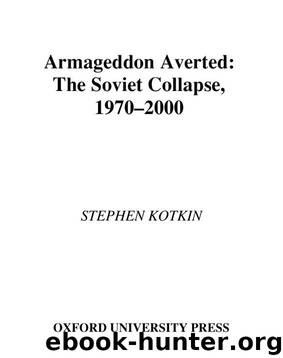Armageddon Averted The Soviet Collapse, 1970-2000 by Stephen Kotkin

Author:Stephen Kotkin [Kotkin, Stephen]
Language: eng
Format: epub
Published: 0101-01-01T00:00:00+00:00
escape the cul-de-sac whereby state socialism empowered a
sclerotic bureaucracy while ‘market socialism’ proved dif-
ficult to realize in practice. As of November 1991, how-
ever, when Boris Yeltsin tapped the academic to head the
Russian government, all that was moot. ‘We were in a situ-
ation’, Gaidar later admitted, ‘where theory was
powerless’. 4
In 1991 the budget deficit would exceed 20 per cent of
118
survival and cannibalism in the rust belt
estimated GDP, and 1992 threatened to be worse (it was).
Soviet gold reserves and foreign currency accounts had
disappeared, never to be found. Soviet foreign debt had
ballooned to $56.5 billion, and creditors were demanding
that the successor states assume full responsibility. Only
Russia did so—the price extracted for the Soviet seat on
the UN Security Council—assuming a formidable burden
at a time when the rouble was undergoing steep devalu-
ation. 5 Russian industry was in free fall, caught between plan and market and politically severed from suppliers and
customers in Eastern Europe as well as the other Union
republics. The officially measured economy declined 6 per
cent in 1990 and an annualized 17 per cent through the
first three-quarters of 1991. (In the worst year of the Great
Depression in the US, 1929–30, the drop was 9 per cent.)
Inflation at the end of 1991 was estimated at 250 per
cent—per month. Enterprises refused payments in
roubles, insisting instead on foodstuffs, vodka, or televi-
sions, especially of foreign origin, which could be distrib-
uted to workers in lieu of money wages. Shops were
emptier than at any time since the famine years immedi-
ately after the Second World War. Before Gaidar had lifted
a finger, Russia was utterly broke and in chaos.
He and his team—a mix of arrogant Young Turk
‘economists’, mediocre political operatives from Yeltsin’s
hometown, and old-hand former Soviet ministers—hoped
to impose monetary stabilization through fiscal discipline,
while also crushing the remnants of the planning system
and clearing a path for market behaviour. The Russian
119
survival and cannibalism in the rust belt
programme was advertised as ‘shock therapy’, on the
example of 1990 Poland and 1970s Chile, by the Inter-
national Monetary Fund, which was unhurriedly negotiat-
ing a large dollar loan to support Russia’s ‘transition’, and
by a handful of self-promoting foreign advisers. But the
idea of de-statization and painful belt tightening as the
path from socialism to the market derived not from for-
eign models but from Russia’s dire circumstances and
Soviet-era conceptions about the market being the oppos-
ite of the planned economy. Gaidar, in any case, violated
shock therapy, conceding that some prices, such as those
for bread and milk, would remain regulated, to protect
the population. Others in government insisted that liber-
alization of energy and fuel prices be ‘delayed’, to ‘pro-
tect’ Russian industry and enable the country to survive
the winter, and Gaidar acceded to the pressure.
On 2 January 1992 Russia ended most but far from all
Soviet-era administered prices in what was dubbed ‘a sin-
gle leap across the abyss’. Overnight, private trade ceased
to be the crime of ‘speculation’, and the country was soon
transformed into a bustling bazaar of buyers and sellers on
street corners. People who bought what turned out to be
unusable goods had no recourse, but shop queues disap-
peared and the goods famine was overcome. Monetary
stabilization, however, proved elusive.
Download
This site does not store any files on its server. We only index and link to content provided by other sites. Please contact the content providers to delete copyright contents if any and email us, we'll remove relevant links or contents immediately.
| Anarchism | Communism & Socialism |
| Conservatism & Liberalism | Democracy |
| Fascism | Libertarianism |
| Nationalism | Radicalism |
| Utopian |
The Secret History by Donna Tartt(19017)
The Social Justice Warrior Handbook by Lisa De Pasquale(12182)
Thirteen Reasons Why by Jay Asher(8880)
This Is How You Lose Her by Junot Diaz(6868)
Weapons of Math Destruction by Cathy O'Neil(6257)
Zero to One by Peter Thiel(5778)
Beartown by Fredrik Backman(5726)
The Myth of the Strong Leader by Archie Brown(5490)
The Fire Next Time by James Baldwin(5421)
How Democracies Die by Steven Levitsky & Daniel Ziblatt(5207)
Promise Me, Dad by Joe Biden(5138)
Stone's Rules by Roger Stone(5073)
A Higher Loyalty: Truth, Lies, and Leadership by James Comey(4944)
100 Deadly Skills by Clint Emerson(4909)
Rise and Kill First by Ronen Bergman(4766)
Secrecy World by Jake Bernstein(4735)
The David Icke Guide to the Global Conspiracy (and how to end it) by David Icke(4694)
The Farm by Tom Rob Smith(4498)
The Doomsday Machine by Daniel Ellsberg(4477)
